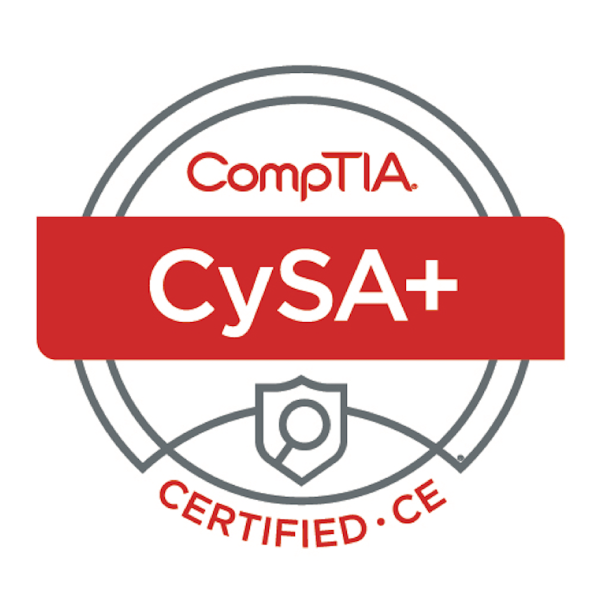Comptia - CS0-002 Certification Exam Details, Questions and Answers
Certification Provider
ComptiaExam
CS0-002: CompTIA CySA+Number of questions (in our database)
338Updated on
14 April 2024
Topics
CompTIA CySA+ (CS0-002) Certification Exam Details
Understanding the Importance of CompTIA CySA+ (CS0-002)
CompTIA Cybersecurity Analyst (CySA+) is an IT workforce certification that applies behavioral analytics to networks and devices to prevent, detect, and combat cybersecurity threats. This certification exam validates your knowledge and skills in cybersecurity analytics, focusing on the latest trends and techniques in risk management, risk mitigation, threat management, and intrusion detection.
Technical Details of CompTIA CySA+ (CS0-002)
The CompTIA CySA+ (CS0-002) is a vendor-neutral certification exam that consists of multiple-choice and performance-based questions. The exam duration is 165 minutes, and you need to score 750 out of 900 to pass the exam. It is recommended that candidates have a minimum of 3-4 years of hands-on information security or related experience.
Measured Skills in CompTIA CySA+ (CS0-002) Exam
The CompTIA CySA+ (CS0-002) exam measures a candidate's ability to perform the following tasks:
- Threat Management
- Vulnerability Management
- Cyber-incident Response
- Security Architecture and Tool Sets
Preparation Advice for CompTIA CySA+ (CS0-002)
For the best preparation, it is recommended to use a combination of resources such as study guides, online courses, and hands-on training. Practice tests are also a great resource to familiarize yourself with the exam format and question types. It's also essential to spend time gaining practical experience in the areas covered in the exam to ensure you're fully prepared.
Exam Topics
-
Security Operations and Monitoring (14% - 20%)
- Given a scenario, use SIEM tools to support security monitoring, detection, and response
- Explain the importance of continuous security monitoring
- Given a scenario, implement incident response and recovery procedures
- Explain the importance of security assessments and audits
- Explain the importance of log management and analysis
- Explain the importance of threat hunting
- Given a scenario, implement threat hunting techniques
- Explain the importance of user and entity behavior analytics (UEBA)
-
Cybersecurity Tool Sets (12% - 18%)
- Given a scenario, use the appropriate tool to assess organizational security
- Given a scenario, use the appropriate tool to analyze and interpret test results
- Given a scenario, use the appropriate tool to remediate security issues and vulnerabilities
- Given a scenario, use the appropriate tool to analyze potential indicators of compromise
-
Threat Management (17% - 23%)
- Implement and support vulnerability management processes
- Implement and support patch management processes
- Implement and support configuration management processes
- Compare and contrast common vulnerability management frameworks and their attributes
- Given a scenario, apply threat intelligence and vulnerability data to improve the security posture
- Explain the importance of data privacy and protection
-
Cyber Incident Response (12% - 18%)
- Given a scenario, distinguish threat data or behavior to determine the impact of an incident
- Given a scenario, prepare a toolkit and use appropriate forensics tools during an investigation
- Explain the importance of communication during the incident response process
- Analyze common symptoms to select the best course of action to support incident response
- Explain the importance of containment and eradication strategies
- Compare and contrast various types of controls
- Given a scenario, implement recovery strategies
- Given a scenario, utilize basic scripting skills to support incident response
- Explain the importance of post-incident response activities
-
Security Architecture and Tool Sets (14% - 20%)
- Given a scenario, implement security solutions that leverage the appropriate tools and technologies
- Given a scenario, implement secure network architecture concepts
- Given a scenario, implement secure systems design
- Given a scenario, implement secure applications and protocols
- Given a scenario, implement secure cloud and virtualization solutions
- Explain the importance of secure staging deployment concepts
- Explain the importance of secure coding practices
-
Compliance and Assessment (11% - 17%)
- Given a scenario, select, implement, and interpret the appropriate compliance and regulatory frameworks
- Given a scenario, conduct an assessment and analyze results to recommend remediation strategies and controls
- Explain the importance of policies, procedures, and awareness
- Explain the importance of physical security controls
- Explain the importance of risk management processes and concepts
- Explain the importance of privacy
- Given a scenario, implement incident response and recovery procedures